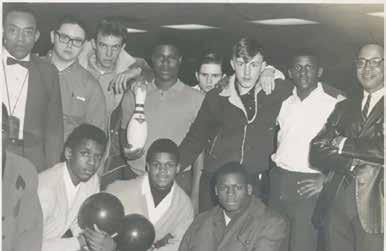
11 minute read
Sports
Guest Columnist
Lessons From Texas
Texas was freezing, and Sen. Ted Cruz was looking forward to sizzling his way to a Cancun vacation. People didn't have drinking water and were advised to boil anything that came out of their faucets. That's easy enough to do when you have no power. Some resorted to burning their furniture, fences, and anything else they could get their hands on. A woman and her two grandchildren perished from flames when they lit a fire in their fireplace to stay warm. Children died from the cold, and Texas's Electric Reliability Council (ERCOT) is being sued. They've sent people five-figure electricity bills, and the absentee governor says power cannot be cut off for nonpayment.
The rest of the nation is looking at Texas (and Louisiana and Oklahoma, but Texas is in the worst shape) with shock and horror. People have queued up for food, water and heat. Many have left their homes to shelter with friends, only to return to
Julianne Malveaux
frozen pipes and flooded floors. Others have thronged to Gallery Furniture, where the civic-minded "Mattress Mack," Jim MCIngvale, opened his store so people could rest in warmth. People slept on high-end beds, recliners, sofas and other furniture, ate snacks and drank water that they could not find at home.
Houston Mayor Sylvester Turner called the crisis the result of "20 years of bad government." He criticized state leadership for the situation and said the state, not individuals, should be responsible for excessive bills. Other mayors, leaders, and Congressional representatives talked about the lack of planning. They seemed resigned to the crisis, which can't be resolved until people have running water and their homes are repaired. Could this happen in Washington, D.C., New York, Denver, or San Francisco? What can we learn from the Texas calamity?
Firstly, we must acknowledge that our infrastructure is crumbling. The American Society of Civil Engineers reports that our infrastructure — our highways and bridges, water systems and dams — has long been neglected and is crumbling. President Biden has an excellent opportunity to generate jobs and repair our aging infrastructure, and it is an effort that should garner bipartisan support. Texas reminds us how fragile our infrastructure is and how much it will cost us, both in money and human misery, if we continue to ignore it.
The Texas debacle should also remind us how intertwined we are. The Texas swashbuckling "go it alone" attitude kept them dis-
MALVEAUX Page 49
Guest Columnist
Rep. Rena Moran
Talking About Death Won't Kill You
As we celebrate Black History Month, we are confronted with the ongoing injustice that African Americans are more than twice as likely to die from COVID-19 as our white counterparts. While some have treated this fact as if it was a new phenomenon, many of us know this is just another example of the disparities in health care outcomes that the Black community has historically and continually experiences.
Whether we're wealthy or working class, we are often diagnosed later, live sicker and die sooner.
And we suffer more at the end of life, often from invasive treatments and lack of adequate pain relief. Our elders in nursing homes also receive feeding tubes at a higher rate and undergo more unnecessary surgeries in the final months of life.
Part of the reason African Americans are often overtreated at the end of life relates to our experiences being denied care by a racist health care system. We may ask for and receive far more intensive and invasive treatments at the end of life, because we fought for the right to receive care and we demand access to it. While this is understandable, it can also be counterproductive if it prolongs suffering instead of preventing it.
Systemic racism accounts for much of the problem, but we also have the opportunity to save ourselves from this overtreatment and the suffering that goes along with it, when we have the knowledge about how to plan for an end-oflife experience that is aligned with our values and beliefs.
We've all heard the phrase "knowledge is power," and it is absolutely true when it comes to advocating for our care and our family's care at the end of life. Although death is inevitable for all of us, there is often a stigma around talking about it at our dinner tables. We don't talk with our family about what they would want when they are close to death, and we don't bring it up with our doctors. My mother and sister passed away from ovarian cancer, and we didn't speak about death until it was imminent, and therefore too late to know what their end-of-life wishes were and take appropriate steps with their doctors. In both cases, I
MORAN Page 49
Guest Columnist
Carl Mack The Misrepresentation of Juneteenth
I strongly oppose the proposed Washington State Bill 1016, and I strongly oppose the passage of Ordinance 19209 by the Metropolitan King County Council, both designed to designate Juneteenth as a state holiday. To date, 46 states have approved June 19 as a paid or legal state holiday. No problem. The issue is the historical reason used to justify their efforts to remember. Many have stated that June 19, 1865, ended slavery in America, which is, historically speaking, grossly wrong.
The state of Washington in their proposed legislation of Bill 1016 stands as a perfect example: "… The legislature intends to designate Juneteenth as a state legal holiday to celebrate the end of chattel slavery." In addition, the language of King County Ordinance 19209 also uses similar language to justify the mis-educated belief that Juneteenth is a historically appropriate day to celebrate the end of chattel slavery.
Other states have used similar language/justifications to recognize Juneteenth as a holiday. In Virginia, Gov. Ralph Northam stated, "It mattered then because it marked the end of slavery in this country." However, a historical fact that many people either are not aware of or choose to ignore is that the 13th Amendment, when it was ratified by the state of Georgia on Dec. 6, 1865, ended chattel slavery as it was passed by Congress and ratified by the required minimum of 27 states (Georgia was number 27) needed for its formal adoption. It must be noted that in the six months leading up to the ratification by Georgia — June 19, 1865, and Dec. 6, 1865 — there were at least 225,000 Black people enslaved in Kentucky alone. Chattel slavery was still LEGAL and practiced in Delaware and Kentucky.
The bill, ordinance, and others like it speak to why Black history should be taught. Blacks got it wrong, Whites got it wrong, Americans of all hues got this wrong. If indeed Black Lives Matter, then the historical actions of these governmental entities are
MACK Page 49
Guest Columnist
Marian Wright Edelman
Mississippi's former Gov. William Winter, who died on Dec. 18, 2020, helped transform Mississippi's rigidly segregated public education system. He ran for office promising to focus on education and kept his promise. His signature accomplishment was a law that improved the futures of Mississippi's children — especially Black children who had been harmed for decades by a separate and profoundly unequal education system. When he took office in 1980, Mississippi was the only state with no compulsory public education requirement, a result of Mississippi's state legislature's racist actions after the 1954 Brown v. Board of Education Supreme Court ruling sought to desegregate public schools.
Gov. Winter spent hours campaigning on the need for change, supported by many Black citizens and community coalitions led by local leaders like the indomitable Mayersville Mayor Unita Blackwell. The first two attempts to get reform through failed, but after Gov. Winter called a special legislative session just before Christmas 1982 focused only on education, the Education Reform Act of 1982 finally passed by one vote. The resulting sweeping and long overdue changes included requiring school attendance, adding funding for public schools, increasing teacher pay, and providing public kindergarten in Mississippi for the first time.
Gov. Winter's attempts to level the educational playing field for Mississippi's children were part of the trajectory that ultimately made him a champion of equal rights and civil rights in his state despite his segregationist roots. His experiences in the Army during World War II serving alongside two Black soldiers in his training class and then as an instructor to an all-Black regiment were among his first exposures to Black citizens as equals and peers and helped shaped his later moderate approach to civil rights as a politician. In his first run for governor in 1967 against a segregationist opponent who accused him of being too liberal, he defended himself by staunchly supporting segregation too.
As governor, he grew and began to welcome and celebrate extraordinary Black Mississippi leaders like Myrlie Evers-Williams. After his term-limited single term ended, Gov. Winter continued to promote civil rights on state and national stages. He served on the Mississippi Department of Archives and History's board for nearly fifty years and helped ensure that the Museum of Mississippi History and the Mississippi Civil Rights Museum, the nation's first publicly funded civil rights museum, were built together near the state's Capitol. President Clinton appointed Gov. Winter
Guest Columnist
Ben Jealous
How Democracy Reform Protects Black Political Power
The 2020 elections taught us that our democracy is both strong and fragile. This is the time to shore it up with the For the People Act that is now waiting for action by Congress.
Voters showed the strength of our democracy by showing up in record numbers to cast ballots to defeat an incumbent president. And voters in Georgia, led by Black voters, made history by electing a progressive Black preacher and Jewish filmmaker to the U.S. Senate.
What makes our democracy strong is that people spent years organizing and building the capacity to educate and motivate voters.
We also saw that our democracy is fragile. A president who did not want to give up his power spent weeks enraging his supporters with lies about the election. He tried to bully state officials to manufacture enough votes to overturn the election. He pressured members of Congress and his own vice president to trash the Constitution. And he urged his supporters to come to Washington and fight to keep him in power. We all saw how that turned out — with a noose on the Capitol lawn, Confederate flags in the rotunda, and members of Congress and their staff hiding in fear for their lives.
The impeachment trial also showed both our strength and fragility. The House of Representatives voted to impeach the president for inciting an insurrection, and a clear bipartisan majority of the U.S. Senate voted to convict him. But most Republican senators refused to defend democracy and hold Trump accountable for threatening it – and that will encourage extremists to turn to violence again.
And now we see Republican state legislators trying to make it harder for people to register and vote. Already this year, they have introduced more than 100 bills to restrict voting.
That’s why we need to take the same kind of energy that we put into the elections and turn it toward getting the House and Senate to pass the For the People Act.
Askia-At-Large
Askia Muhammad
Who Killed Brother Malcolm X?
The assassination of Brother Malcolm X is a subject which, for the most part, I have avoided commenting on because it is wrought with passionate, passionate emotions.
There's hardly a facet of life in the United States — from the White House to your house — which has not been touched by the Brother, first by his 13 years as a strong witness of the benefits of following the teachings of the Honorable Elijah Muhammad and the Nation of Islam's unity lifestyle, and then for the 11 months he spent repudiating Mr. Muhammad, his teacher.
To the question: who killed Brother Malcolm, this much is for sure. Talmadge Hayer, also known as Thomas Hagan, later known as Mujahid Halim, was captured at the Audubon Ballroom. He confessed to being a part of the assassination plot. Norman 3X Butler, later known as Muhamwas jealous" of Malcolm's popularity and because Malcolm was revealing "secrets" about Mr. Muhammad's relationships with young women he employed on his office staff. Not true.
Many people, most of whom reject Mr. Muhammad, see Brother Malcolm as a swashbuckling hero who verbally slew the enemies of Black people, after picking himself up, and reforming himself after a youth of petty crime. He was that.
But because folks have wanted to lionize Brother Malcolm at the expense of his mentor, Mr. Muhammad is blamed for what J. Edgar Hoover and the FBI admitted — wanting to prevent the rise of any "Black messiah" who would galvanize the Black Masses in this country and turn them away from their worship of the White Americans who kidnapped them from Africa, enslaved them, bought and sold them like chattel for 310 years, beat and lynched them for another 100 years, and then Jim Crowed
mad Abdul Aziz, and Thomas 15X Johnson, later known as Khalil Islam, are both innocent men who were framed by the New York City cops, and whose innocence was asserted by the confessed killer from Day One.
The two innocent men were framed so that the Nation of Islam — the Black Muslims, Mr. Elijah Muhammad, et al. — could be tarred with the murder. And sure enough, many people steadfastly believe to this very hour that the Nation of Islam killed Malcolm, because "Elijah Muhammad EDELMAN Page 50
JEALOUS Page 50
ASKIA Page 50





